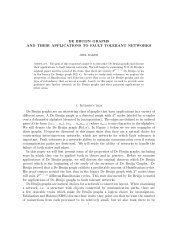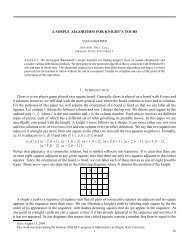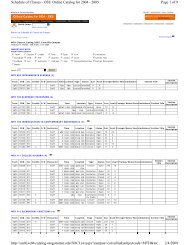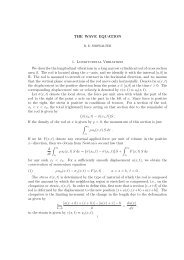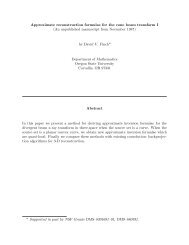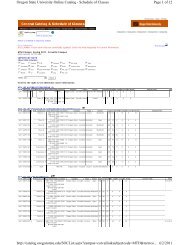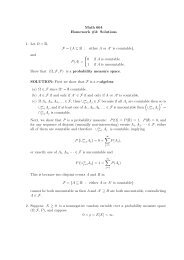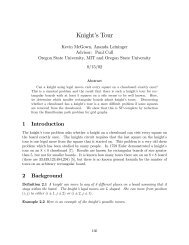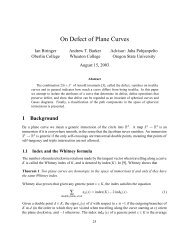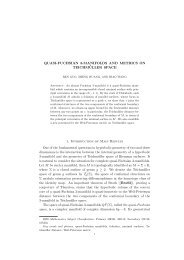- Page 1: NVIDIA CUDAReference ManualVersion
- Page 4 and 5: iiCONTENTS3.5 Stream Management . .
- Page 6 and 7: ivCONTENTS3.10 Direct3D 9 Interoper
- Page 8 and 9: viCONTENTS3.15.2.2 cudaComputeMode
- Page 10 and 11: viiiCONTENTS3.24.2.11 cuParamSetv .
- Page 12 and 13: xCONTENTS3.28.2.3 cuD3D9GetDirect3D
- Page 14 and 15: xiiCONTENTS4.3.1 Detailed Descripti
- Page 16 and 17: 2 Module IndexGenerated on Wed Apr
- Page 18 and 19: 4 Data Structure IndexGenerated on
- Page 20 and 21: 6 Module Documentation3.2 Thread Ma
- Page 22 and 23: 8 Module DocumentationNote:Note tha
- Page 24 and 25: 10 Module Documentation3.4.2.2 cuda
- Page 26 and 27: 12 Module DocumentationParameters:-
- Page 28 and 29: 14 Module Documentation3.5 Stream M
- Page 30 and 31: 16 Module Documentation3.6 Event Ma
- Page 32 and 33: 18 Module Documentationstart - Star
- Page 34 and 35: 20 Module Documentation3.7 Executio
- Page 36 and 37: 22 Module DocumentationConverts the
- Page 38 and 39: 24 Module DocumentationCopies data
- Page 40 and 41: 26 Module DocumentationNote:See als
- Page 44 and 45: 30 Module Documentationextent - Req
- Page 46 and 47: 32 Module DocumentationParameters:p
- Page 48 and 49: 34 Module DocumentationReturns:Note
- Page 50 and 51: 36 Module Documentationdirection of
- Page 52 and 53: 38 Module DocumentationNote:See als
- Page 54 and 55: 40 Module DocumentationcudaMemcpy3D
- Page 56 and 57: 42 Module Documentation3.8.2.24 cud
- Page 58 and 59: 44 Module Documentation3.8.2.27 cud
- Page 60 and 61: 46 Module DocumentationSee also:cud
- Page 62 and 63: 48 Module DocumentationSee also:cud
- Page 64 and 65: 50 Module DocumentationExtents with
- Page 66 and 67: 52 Module DocumentationSee also:cud
- Page 68 and 69: 54 Module Documentation3.10 Direct3
- Page 70 and 71: 56 Module DocumentationpszAdapterNa
- Page 72 and 73: 58 Module Documentation• Resource
- Page 74 and 75: 60 Module DocumentationSee also:cud
- Page 76 and 77: 62 Module DocumentationReturns:Note
- Page 78 and 79: 64 Module DocumentationcudaD3D9Reso
- Page 80 and 81: 66 Module Documentation• cudaErro
- Page 82 and 83: 68 Module DocumentationThis call is
- Page 84 and 85: 70 Module DocumentationParameters:p
- Page 86 and 87: 72 Module DocumentationpResource -
- Page 88 and 89: 74 Module DocumentationcudaD3D10Res
- Page 90 and 91: 76 Module Documentationtex1Dfetch()
- Page 92 and 93:
78 Module Documentationz - Z compon
- Page 94 and 95:
80 Module Documentation3.13 Version
- Page 96 and 97:
82 Module Documentation• template
- Page 98 and 99:
84 Module DocumentationSee also:cud
- Page 100 and 101:
86 Module Documentation3.14.2.8 tem
- Page 102 and 103:
88 Module DocumentationSee also:cud
- Page 104 and 105:
90 Module DocumentationcudaErrorUnm
- Page 106 and 107:
92 Module DocumentationEnumerator:c
- Page 108 and 109:
94 Module Documentation3.16 CUDA Dr
- Page 110 and 111:
96 Module Documentation3.18 Device
- Page 112 and 113:
98 Module Documentation• CU_DEVIC
- Page 114 and 115:
100 Module Documentationtypedef str
- Page 116 and 117:
102 Module Documentation3.19 Versio
- Page 118 and 119:
104 Module DocumentationReturns:Not
- Page 120 and 121:
106 Module DocumentationNote:See al
- Page 122 and 123:
108 Module Documentation3.21 Module
- Page 124 and 125:
110 Module DocumentationReturns:Not
- Page 126 and 127:
112 Module DocumentationnumOptions
- Page 128 and 129:
114 Module Documentation3.22 Stream
- Page 130 and 131:
116 Module Documentation3.23 Event
- Page 132 and 133:
118 Module Documentation3.23.2.4 CU
- Page 134 and 135:
120 Module Documentation3.24 Execut
- Page 136 and 137:
122 Module Documentation3.24.2.3 CU
- Page 138 and 139:
124 Module DocumentationParameters:
- Page 140 and 141:
126 Module DocumentationReturns:Not
- Page 142 and 143:
128 Module Documentation• CUresul
- Page 144 and 145:
130 Module Documentationtypedef enu
- Page 146 and 147:
132 Module Documentationwhere:• W
- Page 148 and 149:
134 Module DocumentationParameters:
- Page 150 and 151:
136 Module DocumentationParameters:
- Page 152 and 153:
138 Module DocumentationFor CUDA ar
- Page 154 and 155:
140 Module DocumentationFor device
- Page 156 and 157:
142 Module DocumentationCUdeviceptr
- Page 158 and 159:
144 Module DocumentationIf dstMemor
- Page 160 and 161:
146 Module DocumentationIf srcMemor
- Page 162 and 163:
148 Module DocumentationcuMemcpy3D,
- Page 164 and 165:
150 Module Documentation3.25.2.18 C
- Page 166 and 167:
152 Module Documentationbytes - Siz
- Page 168 and 169:
154 Module DocumentationNote:See al
- Page 170 and 171:
156 Module DocumentationParameters:
- Page 172 and 173:
158 Module Documentation3.25.2.31 C
- Page 174 and 175:
160 Module Documentationui - Value
- Page 176 and 177:
162 Module Documentation3.26 Textur
- Page 178 and 179:
164 Module DocumentationParameters:
- Page 180 and 181:
166 Module DocumentationParameters:
- Page 182 and 183:
168 Module Documentation3.26.2.12 C
- Page 184 and 185:
170 Module Documentation3.27 OpenGL
- Page 186 and 187:
172 Module Documentation3.27.2.4 CU
- Page 188 and 189:
174 Module Documentation3.28 Direct
- Page 190 and 191:
176 Module DocumentationReturns:Not
- Page 192 and 193:
178 Module Documentation• The pri
- Page 194 and 195:
180 Module DocumentationNote:Note t
- Page 196 and 197:
182 Module DocumentationpHeight - R
- Page 198 and 199:
184 Module DocumentationNote:See al
- Page 200 and 201:
186 Module Documentation3.29.2 Func
- Page 202 and 203:
188 Module Documentation• ID3D10T
- Page 204 and 205:
190 Module DocumentationFor usage r
- Page 206 and 207:
192 Module DocumentationIf pResourc
- Page 208 and 209:
194 Module DocumentationParameters:
- Page 210 and 211:
196 Module DocumentationCUDA_ERROR_
- Page 212 and 213:
198 Module Documentation• typedef
- Page 214 and 215:
200 Module Documentation3.30.2.3 ty
- Page 216 and 217:
202 Module Documentation3.30.3.4 en
- Page 218 and 219:
204 Module Documentation3.30.3.8 en
- Page 220 and 221:
206 Module DocumentationGenerated o
- Page 222 and 223:
208 Data Structure Documentation4.2
- Page 224 and 225:
210 Data Structure Documentation4.3
- Page 226 and 227:
212 Data Structure DocumentationSou
- Page 228 and 229:
214 Data Structure Documentation4.6
- Page 230 and 231:
216 Data Structure Documentation4.7
- Page 232 and 233:
218 Data Structure Documentation4.9
- Page 234 and 235:
220 Data Structure Documentation4.1
- Page 236 and 237:
IndexC++ API Routines, 81Context Ma
- Page 238 and 239:
224 INDEXCUDA_TYPES, 200CUctx_flags
- Page 240 and 241:
226 INDEXCU_FUNC_ATTRIBUTE_MAX_THRE
- Page 242 and 243:
228 INDEXcudaD3D9ResourceSetMapFlag
- Page 244 and 245:
230 INDEXcudaMemcpyToArrayCUDART_ME
- Page 246 and 247:
232 INDEXcudaStream_t, 91CUDART_VER
- Page 248 and 249:
234 INDEXcuMemcpyAtoACUMEM, 147cuMe
- Page 250:
NoticeALL NVIDIA DESIGN SPECIFICATI



